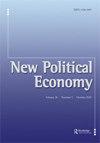“租房者”的出现
IF 3.8
2区 经济学
Q1 ECONOMICS
引用次数: 1
摘要
关于租金和租佃主义的学者比比皆是。通常缺乏对实施寻租的行为者的分析:他们是如何做到的,何时做到的,结果如何。为了解决这一缺陷,我提出了一种三层类型的行动者,我称之为“租房者”。然后,我调查了在基础设施项目的整个生命周期中,租房者在执行所谓的“基础设施租房主义”中的作用:租房者利用剩余资本和劳动力的情况(租房者)。这篇文章通过展示租房者如何在这样的生命周期中积累租金,为“资产化”的不断扩展的文献做出了贡献,这通常是在当地法律框架和政治经济利益相关者的交叉联盟的帮助下进行的,它们共同将商品转化为资产。因此,本文有助于克服资产化学术中公认的盲点:经验主义。通过案例分析,我使用租金概念化和理论化来强调英国、德国和匈牙利大规模(>1亿美元)中资基础设施项目生命周期中基础设施租金主义的多样化实践。我打算将“租房者”概念应用于其他形式的租房主义,并对其进行批评,这些形式不仅限于中国来源的资本、欧洲网站或其基础设施变体。本文章由计算机程序翻译,如有差异,请以英文原文为准。
The emergence of the ‘rentocrat’
ABSTRACT Scholarship on rents and rentierism abounds. Commonly absent is analysis of the actors who perform rentierism: how they do it, when they do it, what outcomes result. To address this lacuna, I advance a three-tier typology of actors I term ‘rentocrats’. I then investigate the role of rentocrats in performing what has been labelled ‘infrastructure rentierism’ across infrastructure projects’ lifecycles: a scenario where surplus capital and labour are utilised by rentiers (rentocrats). This article contributes to an expanding literature on ‘assetisation’ by showing how rentocrats accrue rent across such lifecycles typically helped by local legal frameworks and a cross-coalition of politico-economic stakeholders, which together transform the good into an asset. As such, this article helps overcome a recognised blind spot in the assetisation scholarship: its empiricism. Through Case Study Analysis, I use the rentocrat conceptualisation and theorisation to highlight the variegated practice of infrastructure rentierism across the lifecycles of largescale (>USD100mn) Chinese-sourced capital-financed infrastructure projects in the United Kingdom, Germany, and Hungary. I intend the ‘rentocrat’ concept to be applied to and critiqued against other forms of rentierism not limited to Chinese-sourced capital, European sites, or its infrastructure variant.
求助全文
通过发布文献求助,成功后即可免费获取论文全文。
去求助
来源期刊

New Political Economy
Multiple-
CiteScore
10.10
自引率
9.50%
发文量
41
期刊介绍:
New Political Economy aims to create a forum for work which combines the breadth of vision which characterised the classical political economy of the nineteenth century with the analytical advances of twentieth century social science. It seeks to represent the terrain of political economy scholarship across different disciplines, emphasising original and innovative work which explores new approaches and methodologies, and addresses core debates and issues of historical and contemporary relevance.
 求助内容:
求助内容: 应助结果提醒方式:
应助结果提醒方式:


